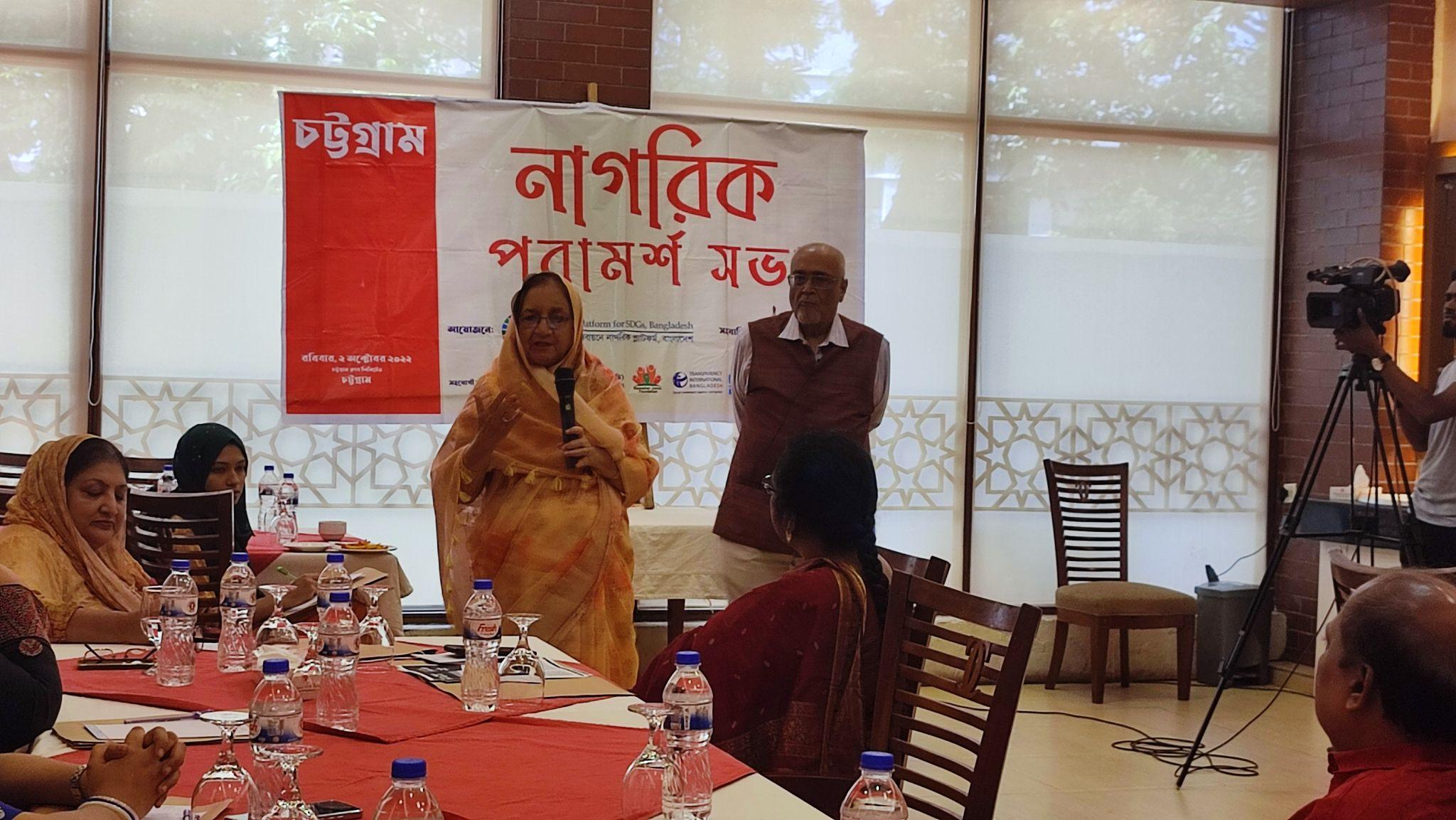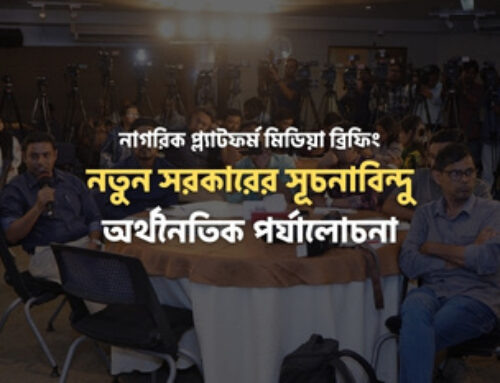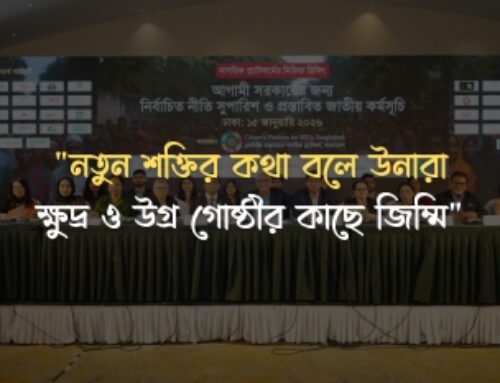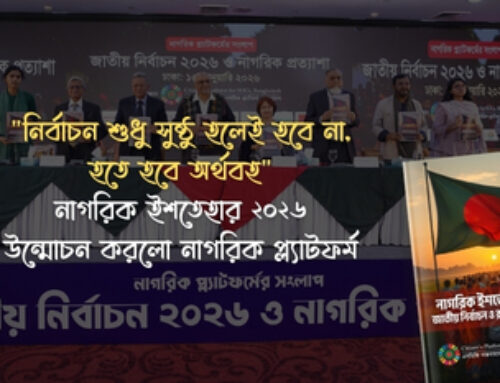
Citizen’s Platform for SDGs, Bangladesh, in collaboration with Ghashful, organised its seventh sub-national consultation meeting in Chattogram on Sunday, 2 October 2022. Earlier such consultations were held in Rangpur, Khulna, Tangail, Sylhet, Thakurgaon and Rangamati. The purpose of this consultation was to bring together the stakeholder representatives of Chattogram and gather their perspectives regarding “development” of their locality. The discussion revolved around asymmetry in development outcomes, corruption in access to public services, quality of education, child marriage, and the issues of people with disabilities (PwD), and adversity of social media concerning the youths.
The fallouts of unplanned infrastructural development in Chattogram were emphasised by the participants. For example, though a number of flyovers have been built in the city, water clogging under flyovers remains unresolved. On a positive note, it was highlighted that 70 percent service of public services in Chattogram are now digitally accessible.
It was maintained that people with disability (PwD) receive only a minimum allowance from the government and do not benefit from other incentives, such as tax rebates. Participants even pointed out that in the country’s latest Population Census (2022), a large part of the PWD community remained unlisted.
 Brille textbooks are being provided by the government to visually impaired people in urban areas, these facilities are yet to reach rural communities. There is also a need for producing textbooks for people with other forms of disabilities e.g., neurological disorders.
Brille textbooks are being provided by the government to visually impaired people in urban areas, these facilities are yet to reach rural communities. There is also a need for producing textbooks for people with other forms of disabilities e.g., neurological disorders.
Concerning public health services, the facilities are inadequate in the rural areas of Chattogram. Community clinic facilities remain either absent or very limited. Moreover, government doctors are often reluctant to work beyond the urban areas. Participants stressed the need for further improvement of Upazilla hospitals for providing better health services to women and senior citizens.
It was reckoned that the education sector is being heavily commercialised. Students in private educational establishments are unable to raise their voices due to fear of possible disciplinary actions. Students are compelled by their teachers to buy guidebooks and attend coaching classes, which often add to the financial burden of the family. It was mentioned that in a certain village, almost half of the students dropped out of school due to their inability to sustain high educational expenses. At the same time, some participants raised the issue of unfair political lobbying in educational institutions; school management committees are often subjected to such political interferences. Education officers of the government at the local level are also intimidated by political figures.
Some participants highlighted a number of adverse trends emerging among young students, particularly involvement in violent group politics and drug addiction. To deal with these challenges in the education sector, participants called for greater awareness and involvement of the parents. They also demanded greater engagement from the citizens regarding these issues. Appreciating the recent success of female footballers, it was observed that urban youths are disengaged from sports due to lack of facilities. Creating opportunities for youth engagement in sports and cultural activities can be meaningful way of keeping them out of harmful drugs and other distractions.
 Regarding gender-based discrimination, female empowerment and representation in public forums were proposed as possible solutions to reduce existing biases. Participants opined that at least one-third of the members of the political parties need to be women. Women’s continued lack of decision-making authority within individual family units is one of the inhibiting factors behind limited female empowerment in the country. Even when the female members contribute financially to the family, they remain marginalised in the decision-making process. Furthermore, participants considered religious orthodoxy, lack of physical security and economic hardship as major reasons for increased child marriage. The need to change mindset and values concerning female child was underscored in this regard.
Regarding gender-based discrimination, female empowerment and representation in public forums were proposed as possible solutions to reduce existing biases. Participants opined that at least one-third of the members of the political parties need to be women. Women’s continued lack of decision-making authority within individual family units is one of the inhibiting factors behind limited female empowerment in the country. Even when the female members contribute financially to the family, they remain marginalised in the decision-making process. Furthermore, participants considered religious orthodoxy, lack of physical security and economic hardship as major reasons for increased child marriage. The need to change mindset and values concerning female child was underscored in this regard.
According to the participants, social media has emerged as an alternative media that uses the technique of clickbait to misguide users, unaware of fraud in digital platforms. As a result, mass people are often deluded with fake information and motivated propaganda instigating hate crimes.
The participants were of a general view that the socio-cultural environment and dominant value system of the country have changed dramatically since 1971. There is increased competition, rather than cooperation, in the society and the economy. The lack of democratic accountability is further aggravating the deterioration of the moral conscience of the country.
Dr Debapriya Bhattacharya, Convener of the Citizen’s Platform for SDGs, Bangladesh, and Mr Towfiqul Islam Khan, Senior Research Fellow, Centre for Policy Dialogue led the consultation session.




